Sierra Leonean lawmaker Hassan Abdul Sesay has challenged the government to honor the day the country became a republic the same way it honors Independence Day.
Sierra Leone gained Independence from Britain on April 27, 1961. But according to Hon. Sesay, the country didn’t attain self-rule then, as it was supposed to.
Sierra Leone was declared independent under independence leader Sir Milton Margai as Prime Minister, who was later succeeded by his brother Albert after his death.
On April 19, 1971, then Prime Minister Siaka Stevens proclaimed Sierra Leone a republic after parliament passed a new constitution, making him the first president of Sierra Leone. Hon. Sesay said before then the Sierra Leone government was answerable to the British monarch.
A member of the main opposition All People’s Congress (APC), the lawmaker raised the issue in the Chamber of Parliament on Tuesday, February 15, in the form of a Personal Explanation (SO3).
The Tonkolili District MP later told ManoReporters in an interview that though Sierra Leone attained independence first, it didn’t attain sovereignty as it remained part of the Commonwealth of nations under the leadership of the British monarch, from which its leaders derived authority.
Hon. Sesay wants the government to not only declare April 19 Republican Day, but to also declare a public holiday in its honor. He also wants the significance of the day to be taught in school, so that the upcoming generations of Sierra Leoneans get to know the significance of the day in the country’s journey to self-determination.
According to him, so many school-going children and even some college graduates hardly know the date the country attained republican status.
Hon. Sesay, who is also the APC’s Whip in the House, argues that a country attains “true sovereignty” only when it decides for itself independently.
Being a republic means that a state is independent of every “vestiges of colonialism.,” he notes.
“I am only observing this because we need to do justice to our constitution…We should not let this fact be relegated to the dustbin of history. Let us keep our history alive because that is part of the process and a procedure that we have gone through,” the lawmaker stressed.
He went on to say that, if Sierra Leoneans don’t want it, it only makes sense to change the constitution back to what it was prior to attaining republican status.
“With a republican constitution, it means that Sierra Leone is a republic. This is a matter of respecting our laws and nationhood. We need to pay attention to the symbolism and ensure that we do the things that bestow respect on our heritage,” he explains.
The debate around the significance of republicanism vis-a-vis independence is not new in Africa.
But in Sierra Leone, the issue has been discussed in the context of the longstanding rivalry between the APC and its archrival, the Sierra Leone Peoples Party (SLPP).
When Sierra Leone attained independence, SLPP was in governance, under Milton Margai, who is considered the lead architect of the country’s independence.
SLPP was founded as a party of indigenous Sierra leoneans and would later lead the clamor for self-rule. Stevens was part of the founders of the party. But he soon fell out to form the APC. He was opposed to independence the time Sierra Leone attained it.
Recognizing Republican Day will therefore mean giving APC and Stevens their rightful place in the country’s struggle for self-rule.
Stevens is also credited for a lot of the infrastructural development Sierra Leone realized during his 18 years in power. But his legacy is also tainted by consequences of his iron-feast leadership style, characterized by imprisonment and, in some cases, killing of political opponents.
One of the darkest sides of his legacy is his transformation of the country into a one-party state in 1978. That enabled him to rule the country for so long.
Steven voluntarily retired from the presidency in 1985 and handed power to his hand-picked successor, Joseph Saidu Momoh. It was under Momoh, a former army chief, that the current constitution was written, paving the way for a return to multiparty democracy.
But a civil war soon erupted, derailing the democratic process.
Momoh was eventually overthrown by the military.
In 1996, amid the civil war, Sierra Leone conducted what many political experts consider as its first democratic election. Ahmad Tejan Kabbah was elected under the ticket of the SLPP.
Kabbah was succeeded by Ernest Bai Koroma in 2007 under APC ticket. And current president Julius Maada Bio succeeded Koroma in 2018.
Besides Independence Day, Sierra Leone already observes many other holidays, which have often attracted criticism for its wastefulness in terms of the economic implications, from Armed Forces Day, to Christmas, Boxing Day, Good Friday, Easter, and a bunch of Islamic feasts.
Quizzed on the economic implications of adding one more day to these, Hon. Sesay said one more day won’t cost the country anything.
“Even if we do not observe the republic day as a public holiday, let us respect the day, a day that people hardly talk about in public or private,” he said.






















